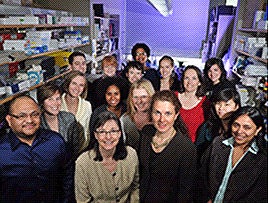Basketball tournament brings with it $100,000 for breast cancer research
Research on breast cancer after pregnancy at the University of Colorado Cancer Center is reaching a key milestone thanks to a gift from nationally renowned cancer research charities in celebration of Denver being host city for the 2012 NCAA Women’s Final Four.
The Kay Yow Cancer Fund and the V Foundation for Cancer Research annually fund cancer research based in the host city of the basketball tournament. This year, the $100,000 grant will fund continuing work at the University of Colorado Cancer Center aimed at preventing young women’s breast cancer.
“We’re at the point where this money will help us finalize the data we need to support a clinical trial for the prevention of postpartum, pregnancy-associated breast cancers,” said grant recipient Virginia Borges, M.D., MMSc, a CU Cancer Center investigator and co-director of the center’s Young Women’s Breast Cancer Translational Program.
Nick Valvano, chief executive officer of the V Foundation for Cancer Research, and Megan Smith, director of marketing and development for the Kay Yow Cancer Fund, presented Borges with a ceremonial check at a news conference at the Anschutz Cancer Pavilion on Dec. 1, about 100 days ahead of the NCAA Women’s Final Four, to be held in Denver on April 1 and 3.
“It is so encouraging to fund research whose target is not only the treatment of breast cancer, but the prevention as well,” said Valvano. “We are proud to be associated with this project.”
“The women’s basketball community has been incredibly supportive of the Fund since its inception, especially during the month of February,” said Marsha Sharp, executive director of the Kay Yow Cancer Fund. “With this in mind, it is very fitting for us to fund research on young women’s breast cancer in the host city of the 2012 Women’s Final Four.”
Founded in 2005 by Borges and co-director Pepper Schedin, Ph.D., the Young Women’s Breast Cancer Translational Program at the CU Cancer Center specializes in the treatment and prevention of breast cancer in women under age 40, with a special focus on pregnancy-associated breast cancer. The program provides comprehensive breast cancer treatment and survival support to more than 100 women each year. The program also instigates and participates in both basic and clinical research into the causes, treatment and prevention of breast cancer in young women.
Borges and Schedin published a paper in Nature Medicine in July 2011 that showed that non-steroidal anti-inflammatory drugs (NSAIDs) like ibuprofen reduce the severity of postpartum breast cancers in animal models, and now the research team will move the preclinical results toward humans.
Borges and Schedin’s work targets an especially at-risk population.
Recent studies show that women who have children before age 30 increase their risk of pre-menopausal breast cancer by 10 percent and women who wait to have children until after age 35 increase their risk by 30 percent.
Not only is breast cancer more prevalent in young mothers than in women who have not had a child, but cancers diagnosed in the early years postpartum also tend to be more aggressive, with increased risk of spreading to other organs.
Women diagnosed with cancer within two years of giving birth have a 40 percent five-year survival rate, as opposed to a 70 percent five-year survival rate for women diagnosed outside the postpartum window.
The pair’s work shows that NSAIDs reduce the wound-like qualities of breasts undergoing the process of involution, during which milk-producing cells are killed and replaced with fat cells. During involution, healthy tissues can be invaded by fibrous collagen, which promotes tumor growth and travel into the lung. NSAIDs decrease production of the enzyme COX-2, which promotes the growth of this fibrous collagen.
“Dr. Schedin and I are the right arm and the left arm of this research organization, and so this grant from the Kay Yow and Jimmy V Foundations will directly fund research that benefits young women,” Borges says.
Borges and Schedin are faculty in the CU medical school, and Borges provides breast cancer care at University of Colorado Hospital.


